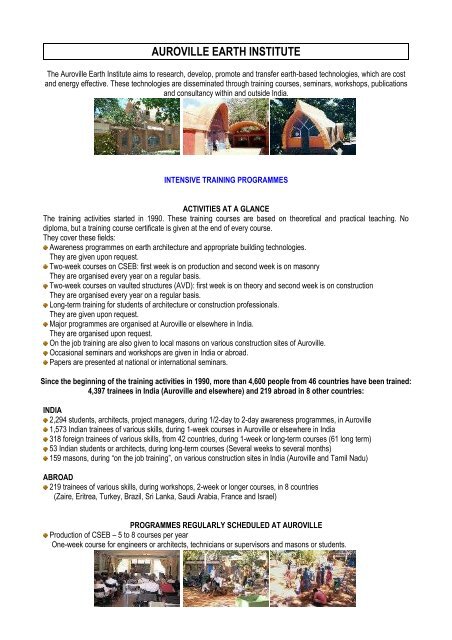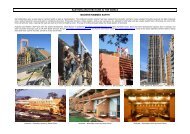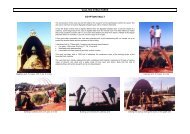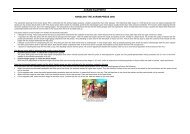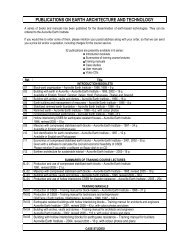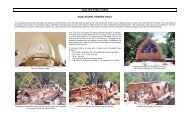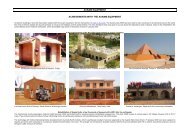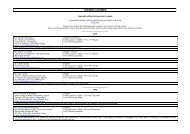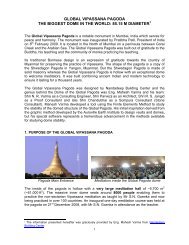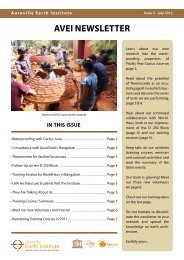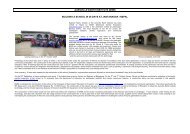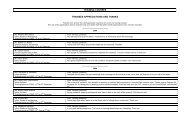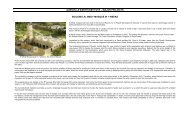Auroville Earth Institute
Auroville Earth Institute
Auroville Earth Institute
You also want an ePaper? Increase the reach of your titles
YUMPU automatically turns print PDFs into web optimized ePapers that Google loves.
AUROVILLE EARTH INSTITUTE<br />
The <strong>Auroville</strong> <strong>Earth</strong> <strong>Institute</strong> aims to research, develop, promote and transfer earth-based technologies, which are cost<br />
and energy effective. These technologies are disseminated through training courses, seminars, workshops, publications<br />
and consultancy within and outside India.<br />
INTENSIVE TRAINING PROGRAMMES<br />
ACTIVITIES AT A GLANCE<br />
The training activities started in 1990. These training courses are based on theoretical and practical teaching. No<br />
diploma, but a training course certificate is given at the end of every course.<br />
They cover these fields:<br />
Awareness programmes on earth architecture and appropriate building technologies.<br />
They are given upon request.<br />
Two-week courses on CSEB: first week is on production and second week is on masonry<br />
They are organised every year on a regular basis.<br />
Two-week courses on vaulted structures (AVD): first week is on theory and second week is on construction<br />
They are organised every year on a regular basis.<br />
Long-term training for students of architecture or construction professionals.<br />
They are given upon request.<br />
Major programmes are organised at <strong>Auroville</strong> or elsewhere in India.<br />
They are organised upon request.<br />
On the job training are also given to local masons on various construction sites of <strong>Auroville</strong>.<br />
Occasional seminars and workshops are given in India or abroad.<br />
Papers are presented at national or international seminars.<br />
Since the beginning of the training activities in 1990, more than 4,600 people from 46 countries have been trained:<br />
4,397 trainees in India (<strong>Auroville</strong> and elsewhere) and 219 abroad in 8 other countries:<br />
INDIA<br />
2,294 students, architects, project managers, during 1/2-day to 2-day awareness programmes, in <strong>Auroville</strong><br />
1,573 Indian trainees of various skills, during 1-week courses in <strong>Auroville</strong> or elsewhere in India<br />
318 foreign trainees of various skills, from 42 countries, during 1-week or long-term courses (61 long term)<br />
53 Indian students or architects, during long-term courses (Several weeks to several months)<br />
159 masons, during “on the job training”, on various construction sites in India (<strong>Auroville</strong> and Tamil Nadu)<br />
ABROAD<br />
219 trainees of various skills, during workshops, 2-week or longer courses, in 8 countries<br />
(Zaire, Eritrea, Turkey, Brazil, Sri Lanka, Saudi Arabia, France and Israel)<br />
PROGRAMMES REGULARLY SCHEDULED AT AUROVILLE<br />
Production of CSEB – 5 to 8 courses per year<br />
One-week course for engineers or architects, technicians or supervisors and masons or students.
Masonry with CSEB – 5 to 8 courses per year<br />
One-week course for engineers or architects, technicians or supervisors and masons or students.<br />
Theory of arches, vaults and domes – 3 courses per year<br />
One-week course for engineers or architects, technicians or students.<br />
Building with arches, vaults and domes – 3 courses per year<br />
One-week course for engineers, architects, technicians or supervisors and masons or students.<br />
Long-term training – Three to five trainees per year<br />
For students of architecture, professionals from India or abroad.<br />
The training duration varies from 1 to 6 months each.<br />
Awareness programmes on appropriate building technologies<br />
One-day or two-day programmes are given to students of architecture, architects or engineers and to project<br />
managers from HUDCO.<br />
PROGRAMMES SCHEDULED UPON REQUEST AT AUROVILLE<br />
They are organised upon request of various organisations.<br />
Intensive course on production and use of CSEB<br />
One-week course for engineers, architects, technicians or supervisors and masons or students.<br />
CSEB technology for earthquake resistance<br />
Two-week course for engineers, architects, technicians or supervisors and masons or students.<br />
A ONE-YEAR STUDY PROGRAMME<br />
The <strong>Auroville</strong> <strong>Earth</strong> <strong>Institute</strong> is presently in the process to get governmental certifications for the research and training<br />
course activities. After a while, the <strong>Earth</strong> <strong>Institute</strong> will conduct a one-year curriculum to students of various levels. This
new curriculum will happen only after a few years, the time for the <strong>Auroville</strong> earth <strong>Institute</strong> to be restructured and to build<br />
new premises. Information will be disseminated in due time.<br />
The <strong>Auroville</strong> <strong>Earth</strong> <strong>Institute</strong> will give these diplomas:<br />
- Post diploma “Specialisation in earth architecture” to architects and engineers<br />
- Diploma “Technician in earth architecture” to educated people, for setting up entrepreneurships<br />
- Diploma “Master mason earth builder” to uneducated people<br />
PUBLICATIONS<br />
A series of books and manuals has been published for the dissemination of earth-based technologies. They can be<br />
ordered to the <strong>Auroville</strong> <strong>Earth</strong> <strong>Institute</strong>.<br />
32 publications are presently available in 6 series:<br />
Introduction booklets<br />
Summary of lectures<br />
Training manuals<br />
Case studies<br />
User manuals for machines<br />
Video CDs<br />
SERVICES OFFERED<br />
Since the very onset the <strong>Auroville</strong> <strong>Earth</strong> <strong>Institute</strong> has been providing consultancy in India and abroad for soil testing and<br />
advice to GOs and NGOs in construction and architecture.<br />
AURAM EQUIPMENT FOR EARTH CONSTRUCTION<br />
A wide range of equipment for building with earth, Auram, has been researched and developed from the very onset. It<br />
ranges from presses for compressed earth blocks, quality control devices for block making, handling equipment, hand<br />
tools, scaffolding, and rammed earth equipment.<br />
This equipment is mostly sold in South Asia and Africa. Nevertheless, the renown of the AURAM Press 3000 has<br />
become such that it is sold worldwide, on all continents, from Europe to South and North Americas.<br />
BUILDING WITH ARCHES, VAULTS AND DOMES<br />
The research with this kind of roofing aims to revive and integrate in the 21 st century the techniques used in past<br />
centuries and millennia, such as those developed in ancient Egypt or during the period of gothic architecture in Europe.<br />
This R&D seeks to increase the span of the roof, decrease its thickness, and create new shapes. Note that all vaults and<br />
domes are built with compressed stabilised earth blocks, which are laid in “free spanning” mode, meaning without<br />
formwork. This is also called the Nubian technique.<br />
APPROPRIATE BUILDING TECHNOLOGIES BASED ON SOIL
This research aims to make extensive use of raw earth as the main building material. The idea is to use a local resource,<br />
which can help developing technologies that are saving energy and are Eco-friendly and sustainable. The main research<br />
and development tries to minimise the use of steel and cement. To date the main synthesis of this research is achieved<br />
with the Training Centre of the <strong>Auroville</strong> <strong>Earth</strong> <strong>Institute</strong>. This building is entirely constructed with stabilised earth from<br />
foundations to waterproofing:<br />
Stabilised rammed earth foundations (with 5 % cement)<br />
Stabilised rammed earth walls (with 5 % cement and a “homeopathic” milk of lime and alum)<br />
Composite columns (Round and hollow CSEB with reinforced concrete)<br />
Composite beams (U shape CSEB with reinforced concrete)<br />
Stabilized earth mortars and plasters<br />
Wide variety of compressed stabilised earth block<br />
Today 16 types of moulds are available for making about 75 different types of blocks<br />
Various vaults with compressed stabilised earth blocks<br />
Alternative stabilizers to cement (“homeopathic” milk of lime and alum)<br />
Alternative water proofing with stabilized earth<br />
Various mixes of soil, sand, cement, lime, alum and juice of a local seed<br />
DISASTER RESISTANT CONSTRUCTIONS<br />
Since 1995, research has been oriented towards the development of a system, which is based on reinforced masonry<br />
with compressed earth blocks that are hollow interlocking. Two types of blocks had been developed: the square hollow<br />
interlocking block 245, which allows building up to 2–3 floors high, and the rectangular hollow interlocking block 295,<br />
which is used only for ground floors.<br />
This technology has been approved by various governments:<br />
- The Government of Gujarat, India, (GSDMA) as a suitable construction method for the rehabilitation of the zones<br />
affected by the 2001 earthquake in Kutch district.<br />
- The Government of Iran (Housing Research Centre) as a suitable construction method for the rehabilitation of the<br />
zones affected by the 2003 earthquake of Bam.<br />
- The Government of Tamil Nadu, India, (Relief and Rehabilitation) as a suitable construction method for the<br />
rehabilitation of the zones affected by the 2004 tsunami of Indonesia.<br />
HOLISTIC APPROACH TOWARDS ARCHITECTURE AND CONSTRUCTION<br />
The attempt is to integrate various alternative technologies and renewable energies, so as to promote eco-friendly and<br />
sustainable development.
In this field the earth, as a building material, plays a major role, but other appropriate technologies like ferrocement,<br />
biological wastewater treatment, solar lighting, wind and solar pumping are also extensively used.<br />
COLLECTION OF SOIL SAMPLES FROM AROUND THE WORLD<br />
We have been collecting soil samples from around the world<br />
since many years. It was initially started for technical<br />
reasons, which were to identify the soil qualities, and to<br />
show the different textures and colours of soil from around<br />
the world.<br />
Today we also collect them as a testimony of Human Unity,<br />
as <strong>Auroville</strong> aims, among other things, to reach this goal.<br />
During the foundation ceremony of <strong>Auroville</strong> on 28th<br />
February 1968, 124 Nations and 22 States of India placed a<br />
handful of soil from their country in the urn, at the centre of<br />
the future city.<br />
Our collection of soil samples from around the world<br />
Today 249 samples from 72 nations are presently displayed in glass in glass bottles at our premises:<br />
Asia : Bhutan, China, Japan, Nepal, Tibet<br />
Central Asia : Kazakhstan, Mongolia, Pakistan, Turkmenistan, Uzbekistan<br />
South Asia : Australia, Bangladesh, Burma, Cambodia, India, Indonesia, Korea, Maldives, Philippines, Sri Lanka,<br />
Thailand, Vietnam<br />
Africa : Burkina Faso, Central Africa, Egypt, Ethiopia, Gambia, Kenya, Madagascar, Maurice Island, Morocco,<br />
Mauritania, Niger, Nigeria, South Africa, Tunisia, Uganda, Zaire<br />
Europe : Belgium, England, France, Germany, Greece, Holland, Italy, Ireland, Netherlands, Norway, Poland,<br />
Portugal, Russia, Spain, Sweden, Switzerland, Turkey<br />
North : Canada, USA<br />
America<br />
South : Argentina, Brazil, Chile, Colombia, Ecuador, Haiti, Mexico, Peru, Uruguay<br />
America<br />
Middle East : Afghanistan, Dubai, Iran, Israel, Oman, Saudi Arabia<br />
You are most welcome to send some samples, either for analysis or for contributing to this collection.<br />
PROJECT NAME,<br />
LOCATION & COST<br />
Visitors Centre,<br />
at <strong>Auroville</strong><br />
30 Lakhs Rs.<br />
MAJOR PROJECTS UNDERTAKEN BY THE AUROVILLE EARTH INSTITUTE<br />
CLIENT & FUNDING<br />
SOURCES<br />
<strong>Auroville</strong> Foundation<br />
Funded by:<br />
- HUDCO<br />
- MNES<br />
- UNCHS / Habitat<br />
MAIN FEATURES CONSTRUCTION<br />
PERIOD<br />
�Appropriate architecture design of 1200 m 2<br />
1989 – 1992<br />
�Appropriate building technologies<br />
40 months<br />
�Renewable energy sources (Solar and Wind)<br />
�Built in collaboration with Suhasini Ayer, Architect<br />
�International Award: ”1992 Hassan Fathy Award<br />
for architecture for the poor”
Shakti Vihara<br />
School<br />
For 700 children,<br />
at Pondicherry<br />
50 Lakhs Rs.<br />
Mirramukhi School,<br />
at <strong>Auroville</strong><br />
15 Lakhs Rs.<br />
Vikas Community,<br />
at <strong>Auroville</strong><br />
75 Lakhs Rs.<br />
Minimum<br />
Emergency House,<br />
At Istanbul, Turkey<br />
~ 1000 USD<br />
Road experiment<br />
0.5 Lakhs Rs.<br />
Dome of the<br />
Dhyanalingam<br />
temple, for Lord<br />
Shiva,<br />
at Coimbatore<br />
11 Lakhs Rs.<br />
AUM Houses,<br />
At New Delhi,<br />
in Orissa and<br />
in Gujarat<br />
Several times<br />
0.65 Lakhs Rs.<br />
NGO Volontariat<br />
Funded by Volontariat<br />
& EEC<br />
<strong>Auroville</strong> Foundation<br />
Funded by:<br />
- Government of India<br />
- <strong>Auroville</strong> Foundation<br />
Collective of clients<br />
Funded by:<br />
- Themselves<br />
- AVI Centres<br />
- <strong>Auroville</strong> Foundation<br />
UNCHS / HABITAT,<br />
through CRATerre<br />
Funded by UNCHS &<br />
Govern t of Finland<br />
<strong>Auroville</strong> Foundation<br />
Funded by itself<br />
Isha Foundation<br />
Funded by itself<br />
HUDCO & NGO<br />
Abhiyan<br />
Funded by themselves<br />
�Appropriate architecture design of 2200 m 2<br />
�Appropriate building technologies (stabilised<br />
rammed earth foundations, CSEB walls and<br />
ferrocement items<br />
�Appropriate architecture design of 635 m 2<br />
�Stabilised rammed earth foundations and walls<br />
�Cloister arch domes (5.76 m span, 2.25m rise), built<br />
with CSEB and without formwork<br />
�Segmental vault (10.35 m span, 2.25m rise), built<br />
with CSEB and without formwork<br />
�Appropriate architecture of 1448 m 2 , on 2 or 4 floors,<br />
with 23 apartments<br />
�Appropriate building technologies<br />
�Renewable energy sources (Solar and Wind)<br />
�Ecological water management<br />
�Biological waste water treatment<br />
�Finalist for the 2000 World Habitat Award, by BSHF,<br />
UK<br />
�<strong>Earth</strong>quake and cyclone resistant house of 9 m 2<br />
�Walls built with hollow interlocking CSEB<br />
�Cloister arch dome (3 m span, 60 cm rise), built with<br />
CSEB and without formwork<br />
�Sub course and wearing course, done with stabilised<br />
rammed earth, stabilised with various kinds of<br />
stabilisation<br />
�Carriage way: 5 m wide x 30 m long<br />
�22.16 m diameter, 7.90 m rise, 54 to 23 cm thick<br />
�Section: segmental ellipse<br />
�Dome, of 570 tons, built with fired bricks with the free<br />
spanning technique (without formwork)<br />
�Disaster resistant house of 23 m2, built with hollow<br />
interlocking CSEB and interlocking ferrocement<br />
channels<br />
�Built in 66 hours at Delhi, and awarded gold medal<br />
by ITPO for the quality of the demonstration<br />
�Built in Orissa for the rehabilitation of the zones<br />
affected by the super cyclone of 1999<br />
�Built in Gujarat in 62 hours for starting rehabilitation<br />
programmes of the zones affected by the 2001<br />
earthquake<br />
1991 – 1994<br />
48 months<br />
1994 – 1995<br />
20 months<br />
1991 – 1998<br />
45 months<br />
1998<br />
2 weeks<br />
1998<br />
3 weeks<br />
December 1998<br />
To January 1999<br />
9 weeks<br />
1 week demonstration<br />
2 weeks (training)<br />
1999, 2000<br />
2001, 2002
Training Centre of<br />
the former<br />
<strong>Auroville</strong> Building<br />
Centre/<strong>Earth</strong> Unit<br />
at <strong>Auroville</strong><br />
50 Lakhs Rs.<br />
Al Medy Mosque<br />
at Riyadh,<br />
Saudi Arabia<br />
~ 440,000 USD<br />
Sri Karneshwar<br />
Nataraja temple,<br />
near <strong>Auroville</strong><br />
20 Lakhs Rs.<br />
<strong>Auroville</strong> Foundation<br />
<strong>Auroville</strong> Building<br />
Centre/<strong>Earth</strong> Unit<br />
Funded by HUDCO<br />
(India), KFW<br />
(Germany)<br />
and personal donations<br />
Ar Riyadh Development<br />
Authority,<br />
Kingdom of Saudi<br />
Arabia<br />
Financed by the city of<br />
Riyadh<br />
Dr. Karan Singh,<br />
Chairman of the<br />
<strong>Auroville</strong> Foundation<br />
�Various stabilised earth technologies on 655 m2<br />
�Stabilised rammed earth foundations<br />
�Walls built with plain or hollow interlocking CSEB<br />
and stabilised rammed earth<br />
�Various vaults of various shapes and spans, built<br />
with CSEB, with the free spanning technique<br />
�Waterproofing done with alternative stabilised earth<br />
plasters<br />
�Biological waste water treatment<br />
�Transfer of technology from <strong>Auroville</strong> to Saudi Arabia<br />
�Various stabilised earth technologies on 420 m2<br />
�Walls built with plain CSEB and stabilised rammed<br />
earth<br />
�Semicircular vaults and domes of 3 m, built with<br />
CSEB, with the free spanning technique<br />
�Minaret of 18.05 m high built with CSEB<br />
�Temple for Lord Shiva Nataraja<br />
�Built with CSEB: pointed cloister dome of 6 m square<br />
�Pyramid of 10.65 m square, with the same<br />
proportions than the great pyramid of Egypt.<br />
Note: 1 Lakh = 100,000 – 1 USD. = ~ 44 Rs. (Value January 2007)<br />
Contact: Mr. Satprem Maïni<br />
Architect – Director <strong>Earth</strong> <strong>Institute</strong><br />
BASIN Network – Partner for South Asia<br />
UNESCO Chair <strong>Earth</strong>en Architecture – Representative for South Asia<br />
1989 – 2002<br />
Ongoing development<br />
(± 60 months)<br />
Jan – Feb 2004<br />
7 weeks<br />
Feb – Sept. 2006<br />
6 months<br />
<strong>Auroville</strong> <strong>Earth</strong> <strong>Institute</strong><br />
Auroshilpam, <strong>Auroville</strong> 605 101 – T.N. India<br />
Tel.: +91 (0) 413 - 262 3064 / 262 3330 Fax: +91 (0) 413 – 262 2886<br />
Email:


